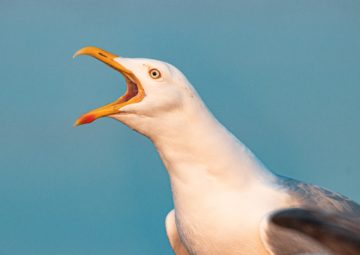by N. Gabriel Martin

What did my friend mean when he told me that there was no such thing as a seagull? He didn’t mean that the aggressive bird that had stolen my chips didn’t exist, nor did he mean that it was something else, not a seagull. He meant that “seagull” isn’t the right word.
He went on to explain that there is no particular species called a seagull. What stole my chips on Brighton beach was a herring gull, which is different from the glaucous-winged gull I’d seen going after fries in Vancouver and the silver gulls that harass picknickers in Sydney.
Okay, fine. But he had no right to correct me. It was a seagull after all. Calling it a herring gull or even Larus argentatus would be no more or less correct than calling it what I’d called it. It wouldn’t even be any more precise.
He was insisting on a distinction that may well be significant for scientific purposes, but which may have obscured the perfectly true things I want to talk about when I talk about nuisance seabirds.
The word “seagull” allows me to trade war-stories with people who’ve lost their food or been pooped on in Canada and Australia. The word “herring gull” doesn’t.
As long as we can keep pedantic ornithologists at bay, we can understand each other and the experiences we have shared. It’s true that seagulls take our chips (or French fries. Whatever.). It’s also true that herring gulls and glaucous-winged gulls and silver gulls take our chips, but the scientific technicality could easily make us miss the point.
If my friend in Vancouver didn’t know that I was talking about a seagull because I said “herring gull” instead, they would miss my point and its relevance to their own life.
This is a problem that couldn’t be solved just by adopting scientific nomenclature more fully. To generalize about these three birds in a scientifically correct way we’d have to talk about the family they belong to (Laridae), which includes not only all gulls (but not the silver gull, since it’s not a gull, taxonomically) but also terns, skimmers and noddies. But our beef isn’t with Laridae—a tern never stole our chips—and it’s not with herring gulls. It’s with seagulls.
I’m not saying that scientists should use the word seagull. If it doesn’t suit their purposes they’re fine to do away with it. Nor am I saying that anything goes. If I call a pacific gull a herring gull any amateur or professional ornithologist would be well within their rights to correct me.
But when I say a seagull stole my chips, not only do I mean “seagull”, I am right to say “seagull”. That’s because it’s true: a seagull did steal my chips. If scientific terminology can’t encompass that fact, so much the worse for scientific terminology.
